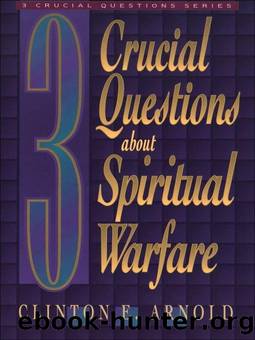3 Crucial Questions About Spiritual Warfare by Clinton E. Arnold

Author:Clinton E. Arnold [Arnold, Clinton E.]
Language: eng
Format: epub
Tags: Spirituality
ISBN: 9780801057847
Google: FIct4YViTlIC
Amazon: 0801057841
Barnesnoble: 0801057841
Goodreads: 726502
Publisher: Baker Academic
Published: 1997-08-01T00:00:00+00:00
Another page, purportedly giving information from St. Germain, attempts to dispel the concern Christians may have about becoming involved in these mediumistic experiences by assuring that âthe Bible is full of channeled material and channeling experiences.â Many of these practitioners actually conceive of Jesus as on the same level as the angels and make him an object of channeling. Of course, the ostensible appeal for calling on these angels is to benefit from their kindness and their powerful aid. âThey will always do their best to help you meet your goals for spiritual advancement and to help you with any problems that you have in your life in any way that they can.â
All of this illustrates a growing tendency for people to explicitly open their lives up to the inhabitation and control of spirit-beings. When Christians involve themselves in such practices, they willingly yield their minds and the members of their bodies to the dominating influence of evil spirits. It is crucial that they recognize this as an avenue of demonic influence and begin to deal with it.
Residual influence from the past. People who have become Christians and have had a background in channeling, witchcraft, sorcery, or other religious practices, and have not yet renounced these beliefs and practices, may have left themselves open to continued and direct demonic influence. The hall closet needs to be unlocked, these things need to be repudiated, and a fresh confession of allegiance to Christ needs to be made.
Virtually every practitioner of contemporary deliverance ministry speaks of the reality of intergenerational (or âfamilialâ) spirits. This concept finds no direct biblical support, in spite of the appeals to the Old Testament texts that speak of the sins of the fathers being visited on the descendants up to the third and fourth generations (Exod. 20:5; Deut. 5:9). These verses speak of guilt and consequential punishment, not about familial spirits passed on to the third and fourth generations. Nevertheless, the concept of intergenerational spirits may receive indirect biblical support in a couple of other ways. First, in his ministry to the severely demonized boy, Jesus finds out from the father that his son had been in that awful condition âfrom childhoodâ (Mark 9:21). The demonization was therefore not the result of the boyâs own sin or his choice to give his allegiance to false gods. The spirits were passed on to him from some other source, the most likely of which would be his family. Second, children tend to act out many of the same sinful patterns of behavior that their parents engaged in. Thus, when we read Old Testament historical books such as 1 and 2 Kings and 1 and 2 Chronicles, we find the kings of Israel typically following in the evil steps of their ancestors. The biblical writer often asserts in the narrative a line such as âhe committed all the sins his father had done before himâ (1 Kings 15:3). These tendencies may not only be genetic and environmental, but may also have a spiritual root.
Download
This site does not store any files on its server. We only index and link to content provided by other sites. Please contact the content providers to delete copyright contents if any and email us, we'll remove relevant links or contents immediately.
The Lost Art of Listening by Michael P. Nichols(6474)
Why I Am Not A Calvinist by Dr. Peter S. Ruckman(3771)
The Rosicrucians by Christopher McIntosh(3049)
Wicca: a guide for the solitary practitioner by Scott Cunningham(2705)
Signature in the Cell: DNA and the Evidence for Intelligent Design by Stephen C. Meyer(2501)
Real Sex by Lauren F. Winner(2476)
The Holy Spirit by Billy Graham(2418)
To Light a Sacred Flame by Silver RavenWolf(2353)
The End of Faith by Sam Harris(2290)
The Gnostic Gospels by Pagels Elaine(2027)
Nine Parts of Desire by Geraldine Brooks(2007)
Waking Up by Sam Harris(1958)
Heavens on Earth by Michael Shermer(1955)
Devil, The by Almond Philip C(1899)
Jesus by Paul Johnson(1887)
The God delusion by Richard Dawkins(1848)
Kundalini by Gopi Krishna(1824)
Chosen by God by R. C. Sproul(1760)
The Nature of Consciousness by Rupert Spira(1689)
